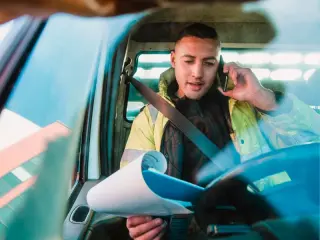
Vehicle breakdowns are extremely common, particularly on main roads and motorways. On UK motorways alone, an estimated 25 vehicles break down every hour. Drivers must know how to act in an emergency so that they can stay safe and protect other road users.
Breakdowns are especially inconvenient and expensive for fleets, as having vehicles off the road and out of action can be costly for businesses.
In this guide, we’ll highlight what to do if you break down on a motorway and provide some top tips to help prevent fleet vehicles from breaking down.
What to do if you break down on a motorway
If your vehicle breaks down on a motorway, it’s important to remain calm and try to exit at the next junction or motorway service area, if possible.
However, if you’re unable to leave the motorway, then you need to ensure that you follow these safety guidelines:
1. Pull over safely on the hard shoulder:
Move onto the hard shoulder or emergency refuge area if available.
Stop as far to the left as you can and turn your wheels left.
If possible, stop near an emergency phone for easier access to help.
2. Make your vehicle visible:
Switch on your hazard warning lights immediately.
Keep your sidelights on if visibility is poor, or if it’s dark or foggy.
3. Get to a safe place:
Leave the vehicle using the doors furthest from traffic.
Stand behind a safety barrier if there is one, and move away from the carriageway.
Keep pets inside the vehicle, as they can create additional hazards if they break loose.
Wear a high-visibility jacket if available.
4. Call for assistance:
Contact your breakdown provider and give details of your location, passengers, and the vehicle fault if known.
If you do not have a mobile phone, use a motorway emergency phone. These connect you directly to the police, who can arrange help.
Important: Around 1 in 10 motorway accidents involve a vehicle on the hard shoulder. Stay alert and move to a safer location as soon as help arrives.
What to Do if You Can’t Reach the Hard Shoulder or Other Safe Space
If your vehicle stops in a live lane and can't be moved, and you can't make it to the hard shoulder, you should:
Immediately switch on your hazard warning lights and sidelights.
Stay inside the vehicle with your seatbelt fastened.
Do not attempt to cross the motorway.
Wait for the police or National Highways Traffic Officers to assist.
This is one of the most dangerous situations on a motorway, so keeping seatbelts fastened and staying put is critical.
What not to do during a motorway breakdown
Certain actions can put you and others at greater risk. Avoid the following:
Do not use a warning triangle on motorways; it is too dangerous.
Do not attempt repairs such as changing a tyre at the roadside.
Do not leave children unattended in the vehicle.
Do not stand between your vehicle and oncoming traffic.
Do not stop to assist other drivers. If you see a stranded vehicle, call 999.
Re-joining the motorway safely
Once your vehicle has been fixed, you’ll need to safely rejoin the motorway.
When ready, use your indicators, build up speed and look for a safe gap in the traffic before pulling into the live lane. It’s also important to be aware that there may be other stationary vehicles on the hard shoulder or in the lay-by ahead of you, so you’ll need to manoeuvre your vehicle safely to avoid a collision.
How to prevent a breakdown
Most breakdowns are avoidable with the right preparation, care and maintenance. Drivers and businesses should focus on preventative measures such as:
Regular vehicle servicing and keeping MOTs up to date.
Checking oil, coolant, and windscreen wash before long journeys.
Responding immediately to dashboard warning lights or unusual vehicle behaviour.
Ensuring tyres are correctly inflated, undamaged, and meet legal tread depth.
Keeping fuel tanks topped up and avoiding misfuelling.
Turning off all electrics when the vehicle is not running to avoid draining the battery.
For fleets, service and maintenance plans are a cost-effective way to reduce the risk of breakdowns and keep vehicles roadworthy.
The role of Fleet Managers in breakdown prevention
For businesses, breakdowns don’t just mean inconvenience. It's vehicles out of action, lost productivity, and potentially reputational damage - not to mention the potential risk of death or serious injury should a colleague be involved in a road traffic accident.
Fleet managers have a key role in preventing and managing these incidents.
Training drivers: Ensuring all drivers know how to react in a motorway breakdown can reduce risks and improve safety.
Arranging cover: Breakdown cover should be in place for all fleet vehicles, with clear guidance given to drivers on who to contact.
Maintaining vehicles: Keeping a record of servicing schedules and ensuring repairs are carried out promptly reduces the risk of roadside failures.
Communicating processes: Drivers should have clear instructions and contact details to follow in an emergency.
By taking a proactive approach, fleet managers can protect both drivers and business operations.
How RightProtect supports businesses
Even with strong maintenance processes and breakdown cover, unexpected issues can still create financial and legal risks for businesses. That’s where RightProtect, our legal support service, provides an extra layer of security.
RightProtect has been designed to give businesses peace of mind when the unexpected happens on the road. It gives your drivers 24/7 access to a qualified solicitor by the roadside, should they be involved in a blue light accident. This means your business can have peace of mind, without worrying about drivers saying the wrong thing by the roadside..
Key benefits of RightProtect include:
24/7 solicitor telephone support in the event of a blue light accident.
Protection for drivers against potential liability risks.
Financial reassurance for businesses, helping you avoid costly and unexpected legal escalation.
Support alongside your fuel card account, so you manage both operational and legal risks in one place.
By combining breakdown prevention with the protection offered by RightProtect, businesses can keep fleets running smoothly while safeguarding against legal and financial challenges.
Key Takeaways
If you break down on a motorway, prioritise safety by pulling left, switching on hazards, and exiting the vehicle when safe.
Never attempt repairs at the roadside. Call for professional assistance.
Breakdowns are often preventable with regular checks and servicing.
For businesses, proper fleet management and breakdown cover are essential to minimise downtime and costs.
With RightProtect in place, you also gain protection against legal risks linked to driving incidents.




